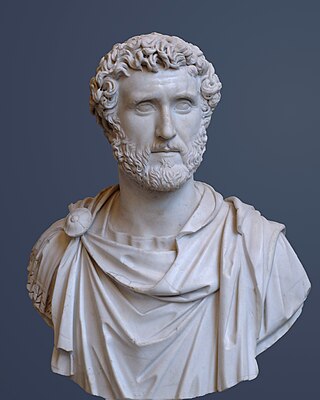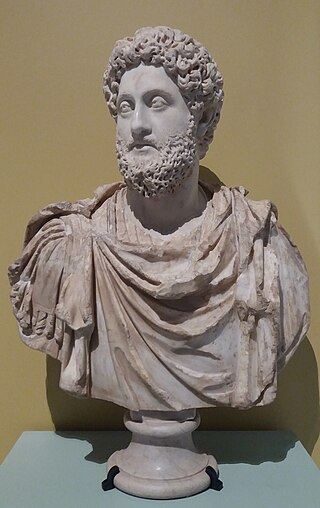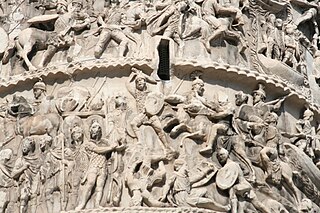Related Research Articles

Titus Aelius Hadrianus Antoninus Pius was Roman emperor from AD 138 to 161. He was the fourth of the Five Good Emperors from the Nerva–Antonine dynasty.

Marcus Aurelius Antoninus was Roman emperor from 161 to 180 and a Stoic philosopher. He was a member of the Nerva–Antonine dynasty, the last of the rulers later known as the Five Good Emperors and the last emperor of the Pax Romana, an age of relative peace, calm, and stability for the Roman Empire lasting from 27 BC to 180 AD. He served as Roman consul in 140, 145, and 161.

Commodus was a Roman emperor who ruled from 177 to 192. He served jointly with his father Marcus Aurelius from 177 until the latter's death in 180, and thereafter he reigned alone until his assassination by Narcissus. His reign is commonly thought to mark the end of a golden age of peace and prosperity in the history of the Roman Empire.

Gordian I was Roman emperor for 22 days with his son Gordian II in 238, the Year of the Six Emperors. Caught up in a rebellion against the Emperor Maximinus Thrax, he was defeated by forces loyal to Maximinus, and he committed suicide after the death of his son.

Gordian II was Roman emperor with his father Gordian I in 238 AD, the Year of the Six Emperors. Seeking to overthrow Maximinus Thrax, he died in battle outside Carthage. Since he died before his father, Gordian II had the shortest reign of any Roman emperor, at 22 days.

Lucius Aurelius Verus was Roman emperor from 161 until his death in 169, alongside his adoptive brother Marcus Aurelius. He was a member of the Nerva–Antonine dynasty. Verus' succession together with Marcus Aurelius marked the first time that the Roman Empire was ruled by more than one emperor simultaneously, an increasingly common occurrence in the later history of the Empire.

Lucius Aelius Caesar was the father of Emperor Lucius Verus. In 136, he was adopted by the reigning emperor Hadrian and named heir to the throne. He died before Hadrian and thus never became emperor. After Lucius' death, he was replaced by Antoninus Pius, who succeeded Hadrian the same year.

Annia Galeria Faustina the Elder, sometimes referred to as Faustina I or Faustina Major, was a Roman empress and wife of the Roman emperor Antoninus Pius. The emperor Marcus Aurelius was her nephew and later became her adopted son, along with Emperor Lucius Verus. She died early in the principate of Antoninus Pius, but continued to be prominently commemorated as a diva, posthumously playing a prominent symbolic role during his reign.

Annia Galeria Faustina the Younger was Roman empress from 161 to her death as the wife of emperor Marcus Aurelius, her maternal cousin. Faustina was the youngest child of emperor Antoninus Pius and empress Faustina the Elder. She was held in high esteem by soldiers and her husband as Augusta and Mater Castrorum and was given divine honours after her death.

The gens Aurelia was a plebeian family at ancient Rome, which flourished from the third century BC to the latest period of the Empire. The first of the Aurelian gens to obtain the consulship was Gaius Aurelius Cotta in 252 BC. From then to the end of the Republic, the Aurelii supplied many distinguished statesmen, before entering a period of relative obscurity under the early emperors. In the latter part of the first century, a family of the Aurelii rose to prominence, obtaining patrician status, and eventually the throne itself. A series of emperors belonged to this family, through birth or adoption, including Marcus Aurelius and the members of the Severan dynasty.

The Marcomannic Wars were a series of wars lasting from about 166 until 180 AD. These wars pitted the Roman Empire against principally the Germanic Marcomanni and Quadi and the Sarmatian Iazyges; there were related conflicts with several other Germanic, Sarmatian and Gothic peoples along both sides of the whole length of the Roman Empire's northeastern European border, the river Danube.

Calvisia Domitia Lucilla, was a noble Roman woman who lived in the 2nd century. She is best known as the mother of the Roman Emperor Marcus Aurelius.
Marcus Annius Verus was the paternal grandfather and adoptive father of the Roman Emperor Marcus Aurelius, and father-in-law of emperor Antoninus Pius.

Bruttia Crispina was Roman empress from 178 to 191 as the consort of Roman emperor Commodus. Her marriage to Commodus did not produce an heir, and her husband was instead succeeded by Pertinax.
Gaius Claudius Maximus was a Roman politician, a Stoic philosopher and a teacher of Marcus Aurelius. No works by him are known to exist; however, he is mentioned in a few prestigious works from classical literature.

The early life of Marcus Aurelius spans the time from his birth on 26 April 121 until his accession as Roman emperor on 8 March 161.
The Roman–Parthian War of 161–166 was fought between the Roman and Parthian Empires over Armenia and Upper Mesopotamia. It concluded in 166 after the Romans made successful campaigns into Lower Mesopotamia and Media and sacked Ctesiphon, the Parthian capital.

The reign of Marcus Aurelius began with his accession on 7 March 161 following the death of his adoptive father, Antoninus Pius, and ended with his own death on 17 March 180. Marcus first ruled jointly with his adoptive brother, Lucius Verus. They shared the throne until Lucius' death in 169. Marcus was succeeded by his son Commodus, who had been made co-emperor in 177.
Gaius Valerius Eudaemon was a Roman eques who held a number of military and civilian positions during the reigns of the Emperors Hadrian and Antoninus Pius, which includes praefectus of Roman Egypt. He is known as a close friend of the emperor Hadrian.
Titus Furius Victorinus was a Roman eques who held a number of appointments during the reigns of the Emperors Antoninus Pius and Marcus Aurelius. The most prominent of these offices were praefectus vigilum, praefectus or governor of Roman Egypt, and praetorian prefect.
References
- ↑ Klonnek, Martin (2014). Chronologie des Römischen Reiches, vol.2. epubli. p. 152. ISBN 978-3-7375-0702-8 . Retrieved Aug 29, 2018.
- ↑ Adams, Geoffrey William (2013). Marcus Aurelius in the Historia Augusta and Beyond. Rowman & Littlefield. p. 76. ISBN 978-0-7391-7639-9 . Retrieved Aug 29, 2018.
- ↑ McLynn, Frank (2009). Marcus Aurelius: A Life. Da Capo Press. p. 79. ISBN 978-0-306-81830-1 . Retrieved Aug 29, 2018.
- ↑ Bryant, Ernest Edward (1895). The Reign of Antoninus Pius. Cambridge University Press. p. 95 . Retrieved Aug 30, 2018.
- ↑ Thomas, Edmund (2007). Monumentality and the Roman Empire. Oxford University Press. p. 212. ISBN 978-0-19-928863-2 . Retrieved Aug 30, 2018.